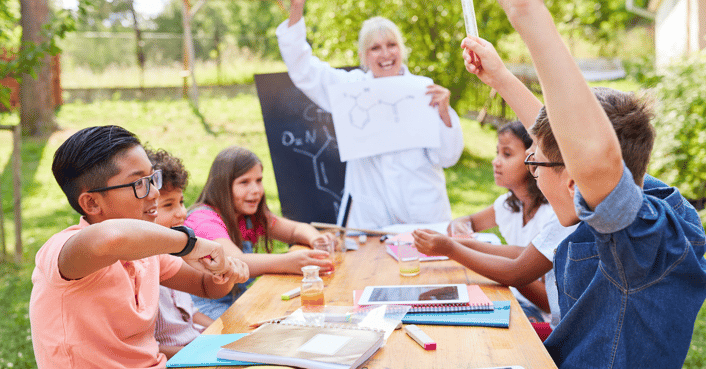
Nothing frustrates K-12 educators more than the sudden adoption of a new curriculum, ed tech tool or program, particularly if that adoption is not accompanied by ample support and training. However, during the academic year teachers are stretched to the limit attending to their students and delivering instruction, with very little margin for their own learning. Typically new resources are introduced at the beginning of a school year, allowing teachers a few in-service days to dig in but those days fly by with staff meetings, classroom setup, and whole school systems finalization. With such limited time, how can educators adequately investigate new resources and find programs that are right for their students?
If it seems like there’s never a perfect time to try new tools before you buy or pilot a program, consider doing so during summer school. Summer school offers a unique opportunity for educators. Without the pressure of the regular school year, it can be a great time to test-run new products and resources without having to fully commit to them. Read on for five reasons why summer school is the perfect time to pilot products in the K-12 classroom.
1. Summer school allows teachers more time to get to know the material.
Because there’s no pressure to implement new programs immediately, teachers can explore the material at their own pace and take their time to get familiar with the product. This helps them better internalize the material so they can ultimately be even better instructors when it comes time to formally adopt the program. Summer school days are often shorter and less demanding than the traditional school year, automatically affording some extra time and energy to get familiar with new material.
2. Pilot resources can refresh existing summer school curriculum.
If teachers are looking for something new to re-engage students but don’t know where to begin or what’s best for their classroom, piloting new resources gives them the opportunity to try a multitude of different programs. Forget about sticking to just one; they can test as many programs as they like until they discover the best fit. This gives educators a low-stakes way to enhance existing curriculum and ultimately help them keep up with the changing and evolving landscape of 21st century instruction.
3. Students can offer feedback based on their pilot experience.
During summer school, teachers often have the benefit of working with a smaller class. With fewer students in the classroom, there are more opportunities to have detailed conversations and debriefs with students about the pilot program. In real time, students can share their likes, dislikes, and general thoughts, while educators work out the kinks before implementing in the established syllabus. Making sure students have a chance to voice their honest opinions is a great way to foster vocal empowerment and build strong classroom culture. This could also ultimately help students feel more invested in these programs if adopted, knowing that they played a role in the final decision to purchase.
4. Piloting programs builds relationships with vendors.
If educators are interested in working with a particular company, this could be a great time to make that connection. They can get to know the staff and learn about their other products. If teachers have a good experience with them, the vendor can become a trusted resource for the future. This will ensure quality programs for students for years to come and keep engaged educators at the top of a company’s valued customer list.
5. A summer school pilot saves time in the future.
Between the quick transition from summer school to the regular academic year and the amount of personal time teachers invest in lesson planning, time is definitely of the essence when it comes to solidifying curricular decisions. When educators pilot programs during summer school, they go into the new school year both knowing which programs they intend to use and how to effectively use them easing the back-to-school stress.
Educators as Scientists
Some say teaching is an art, while some argue it’s a science. Perhaps it’s a little bit of both. The best educators tinker, experiment, hypothesize and draw conclusions based on their daily instruction and interactions with students.
EdCuration makes it even easier for educators to embrace this experimentation mindset as they develop lesson plans and pilot new programs. With the Certified EdTrustee Program, educators get access to a network of resources that make it easy to refresh their curriculum. Pilot programs come at no cost to EdTrustees, which makes it easier for teachers to decide on what’s best for their classrooms. With the support of the EdTrustee community, educators also have the ability to get recommendations and feedback about the programs they are interested in piloting from fellow trustees. If you’re ready to take the first step in becoming a Certified EdTrustee, apply here.
This summer, consider piloting new products during instruction. It’s a great opportunity to explore new resources, try out different programs, and get feedback from students before the start of a new school year.

